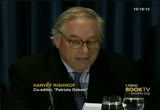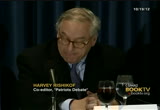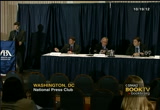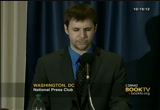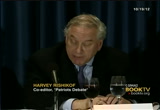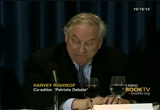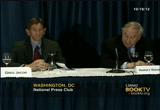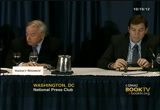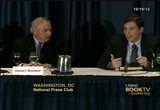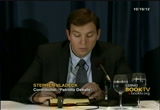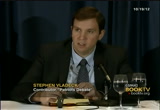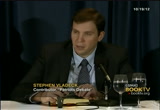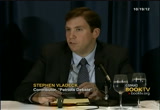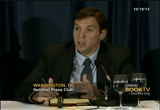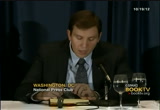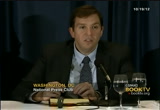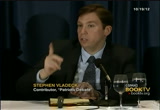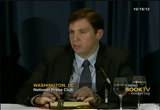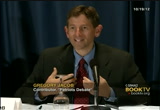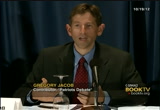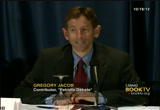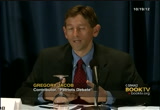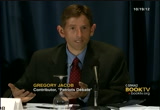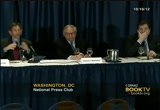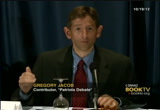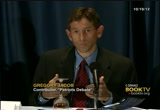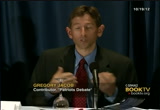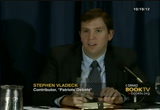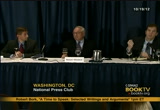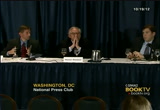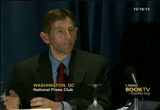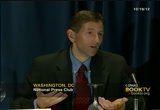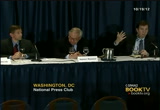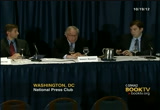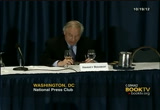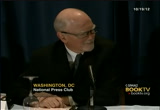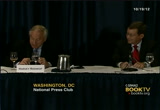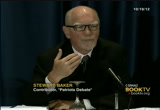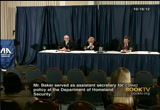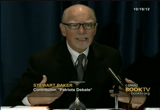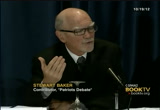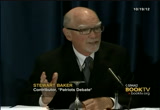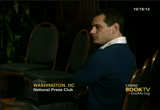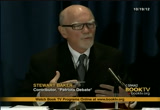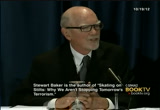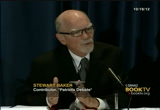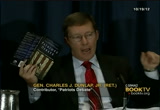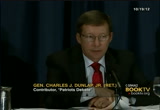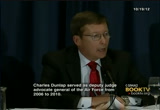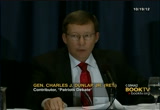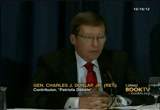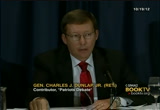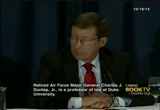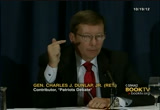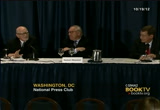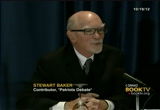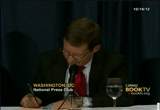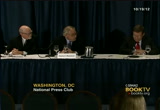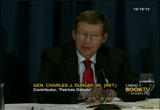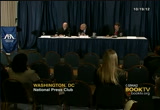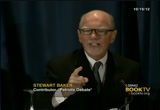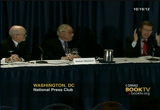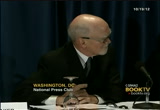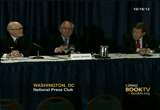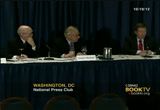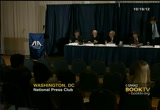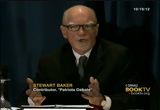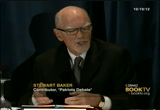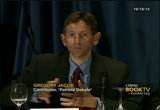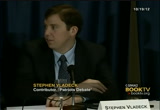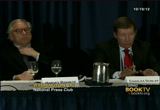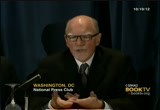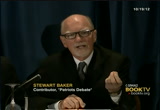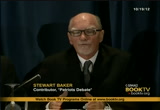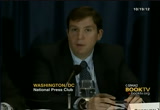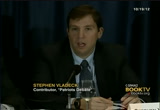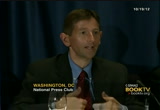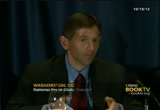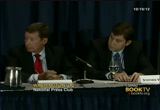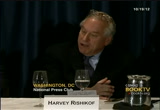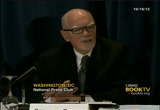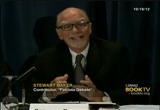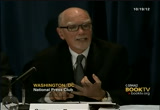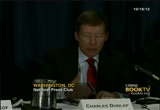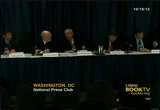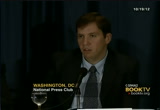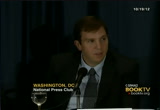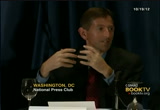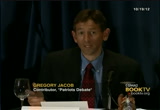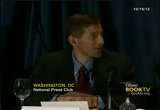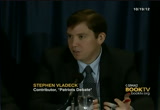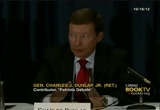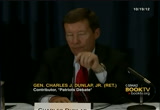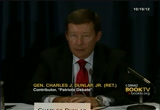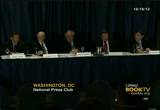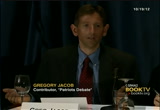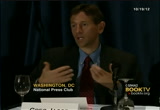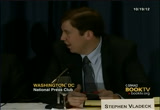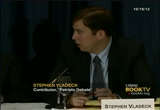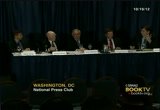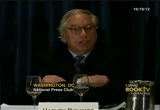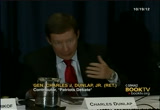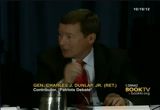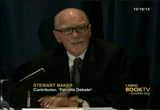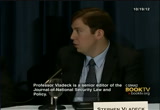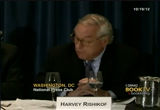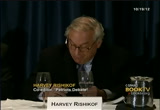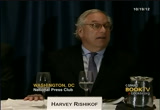tv Book TV CSPAN December 22, 2012 10:00am-12:00pm EST
10:00 am
we are here to introducer our new book that has just come out. it is called patriots debate, national security law on both sides. we are very pleased to announce the book cover has received the 2012 american graphic design award and it is our hope not only will the outside win an award but perhaps the inside. ..
10:01 am
critical and important debates. we have one of the senior members working in the back. we want to think jack for being here and all the support that you have given, not only in the book but our committee since you have joined the bar association. appreciated. i speak on behalf of all of our committee. we are pleased to say that we have a number of positive responses. the former national counterintelligence executive,
10:02 am
the director, bob bryant, one of the best of the key issues of the national security arena. what makes a stand that is the bipartisan dialogue, intellectual rigor, timeliness, and readability. a must read for practitioners and policy makers and the general public. i take with of would like to do that this point is sort of explain how the book came about. the person going task to do that is bernie horowitz. as briefly explain the process by which he decided to come about to write this book. >> good afternoon. i would like to thank the committee on law and national security for giving me the opportunity to work on this book project. if he told a couple of years ago , i was still at college that soon thereafter are be working gun national security policy book, would have told you were crazy.
10:03 am
i have been to a number of committee events in the past and i often hear panelists described that only now we seem national-security will really come into its own separate field and seeing enterprises like welfare in national security loan center will reviews and journals popple ball over the place. speaking as somebody who represents the yen is generation to directly experience the september 11th to attack, this was true of my own life. and never had the chance to study national security policy in his school were in college which is what i wrote my undergraduate senior thesis on the patriot act. it was during that time i encountered the predecessor to our book called patriot debate which came out in 2005. what distinguished patriot did debate is this wonderful structure with the operational debate this is focused very much on policy rather than personalities. many of the other books i
10:04 am
encountered at the time around two dozen 8-9 really just were regurgitated platitudes about security. the wall between intelligence and law enforcement, and i mention that i felt that patriot debate served an all-purpose. he said to welcome it happen something abut doing a new addition. ask jim moran case plant that he wanted to pretend the same structure, the oppositional debate essays, and he wanted to bring back as many of the authors as they could . hawaiian 25 he was considering a up three visitation of the patriot act after ten years. i thought it might be interesting if we apply the rubric of patriot debate to the purpose of explicating the ten
10:05 am
most interesting and pressing national security policy topics that are currently on the docket which is what we ended up doing. here we are year and a couple of months later. we feel that we have accomplished our goal, which is to provide substance analysis to these issues which is also accessible and we feel that the book appeals to a much wider demographic than just the national security policy crowd. a think anybody interested in politics and government will find "patriots debate" worth their time. thank you all for coming. i would like to thank our authors or contributed essays and to a get to debate these topics extemporaneously in public square. the structure, the first hour will be conducting the debates on a relatively formal basis. first several war and then we can put questions and the note
10:06 am
cards on your seat spirit of will take the committee for the event and turn things back over to my friend and co-editor. >> a living example of will we love to see which is that someone interested in national security law is undergraduate and the committee that will produce documents better able to be used for teaching purposes and then we hope one day we will end up in law school perhaps with an attorney. thank you for everything you've done. the logic, the framework as follows, the first part of the book deals with the war on terrorism demand utility second power which has a debate. homegrown terrorism which is a debate. in the interrogation issue which is a debate for abrams. and been moved to an area we thought, part two, very big
10:07 am
issue. data, technology, and privacy. broca number of debates which include third-party information issues this is a debate. national security of all other issues which is between richardson and couponing. and then we have the einstein. we thought it will be interesting to have a debate about what the new technology is moving forward with his between gen dempsey and paul rosenzweig. and then the communications system law-enforcement act. what's next, susan land out. we are starting with the framework of a week-old legal frameworks for projecting force. we will have to of those debates .
10:08 am
to they were going to do cyber warrant attention policies and start off with the tension policies. dry to start off with craig jacobs. and both individuals are quite well known to be, but not to you and the audience. served in several high-profile positions in the government including at the white house to the other partner justice, the department of labor. most recently great served as the third ranking official of the part of labor. in this position he saw -- over some within six ripleys include forward 25 attorneys, broadly man is the department of litigation he has also served to the senior adviser to the secretary of labor and attorney advised the
10:09 am
department of justice office of legal counsel. he helped with stability in toward reform. what we want him to participate. on my left professor assisted team for scholarship that america inner-city los them college of law. we all agree is a nationally recognized expert to also part of the legal team that successfully challenged the bush of ministration use of military tribunals in guantanamo bay, cuba. this co-editor. he has written a number of reports on a broad range of issues spill.
10:10 am
he has won awards for scholarship and his service. he has been a senior editor at the peer review journal of foreign policy and the senior contributor to the. [indiscernible] which many of us, the first things we looked at in the morning. >> after? >> after. and a member of the court association of america. the clerk for the hon. warship berge john and barquette . and while a law student he was an editor from the yale law journal. i believe that is accredited. so as you can see, at two very talented. their debate is entitled to,
10:11 am
detention policies. the way we set it up was we have -- in the book we will do it as live. steven will start and then will have great respond. >> great. thank you. it's a pleasure to be here. >> seven the fortitude to invite me to participate. i am a firm believer that the best they we can do as academics is raise the level debate. projects like this can only help in that regard with folks actually engaging with each other as opposed to talking past each other. let me offer couple of brief remarks that i lost a consistent with what i said in the book. i want to suggest that of all the myriad questions one could ask about the future of u.s. detention policy in the war on terrorism, the government's
10:12 am
ability to detain without trial individuals suspected of involvement in terrorism, it seems that the one that dominates all others is the extent to which future u.s. to some policy will and should be subject to judicial review. why is this not settled? well, if you the citizens and non-citizens, i think it's both sold and moved that these dissensions will be subject to review, settled because we have a series of cases in the early part of the last decade or the courts actually rejected arguments offered by the bush and restoration that such cases raised a political question settled because these individuals clearly have rights of the constitution including the right tit review and neat because dss has not picked up anyone hitting this category and subject -- subjected them to end of military tension says it doesn't three. there have only been three cases
10:13 am
in custody their detention in austin years now, and i think that's partly going to stay for a while. it settled at guantanamo as well . the court held that the suspension claus has full affect at guantanamo. the result of which is there will be, has been, shall be judicial review going forward for the now 160 sell-off detainees still held at guantanamo. the reason why the guantanamo concept is less interesting is because these aren't all legacy cases. there have been no knew detainee's says to a dozen sixth, and there are fairly compelling reasons why they won't be inclined to add tt is a steadily reduced to eating po. instead, this matters for non-citizens elsewhere, picked up outside the united states,
10:14 am
will feature u.s. detention policy be subject to judicial review? if not because all we're doing is putting a policy and non law. it seems like that is the question that comes first. after the decision in april 2009 the judicial judge held in the case that the suspension claus actually does also run to bagram at least in cases where the individual in question is not a citizen of afghanistan and was not arrested and afghanistan, was not picked up on the battlefield. for individuals who are citizens of countries other than afghanistan picked up outside of afghanistan the holding of the district court was there should be a judicial review at least in those cases under permit the. in 2010 the d.c. circuit reversed and the opinion by chief judge sentelle held that it seemed like the suspense in
10:15 am
clause should not run, even in the context of individuals or another from our picked up in afghanistan. the central animating principle behind the d.c. circuit reasoning was that these detainees could not show that they were held for the sole purpose of evading judicial review. what they could discuss at the l.a. and lest they should, and we accept that as a challenge, so that was actually resolved this morning. you knew we were having this panel. another ruling holding that even with the new evidence submitted is still was enough. if that decision is affirmed on appeal it will mean practically speaking that there will not be a judicial review of any detention about citizens were picked up outside the u.s. and not sent to guantanamo which is
10:16 am
an enormous steel. that's totally would change the dynamics of this conversation. briefly, but i want to do, cue this up for greg to should be done and suggest that there are three methods behind it. you may know if he did not already from the social network, our family has the statute of three lives. i want to talk about the three minutes, almost the same thing. and here is number one. behind the reasoning of the d.c. circuit was a very important distinction, at least to them, between bagram and guantanamo. the united states is only exercising a form of joint control over the detention facility, over the pension operations that we were actually involved in this joint attention relationship with the government of afghanistan. in fact, that does not appear to be true. the more time has gone wrong, the more statements that have been released by the government, including the president himself, the afghan government has said,
10:17 am
no, actually, we don't want to detain these people. we don't have an interest in detaining non afghans who were not picked up in afghanistan. this is entirely your problem. you have to fix it. indeed, the point has made it somewhat harder for the obama of ministration to wind down the detention operations than they had initially predicted. myth number one, joint control. at least for non afghan citizens who are not in afghanistan it looks like guantanamo. myth number two, there are bullets flying. i don't here to say that it is a myth that there are bullets flying in afghanistan. of course there are. still active combat operations, still violence every day, assaults on u.s. troops, but with the d.c. circuit said was it would be preposterous to think that the government would intentionally in danger these detainees by holding them somewhere where they were subjected to violence and that
10:18 am
we really should not be thinking about the role of the court into fair with active combat operations. the problem with that statement is that it lies the extent to which the detainees in question were not picked up by the military. there were not picked up on the battlefield. two of them were captured in europe, when north africa, and there were transported into harm's way, not out of harm's way. so there's a danger to the detainees, one entirely of the government's conduct a detainee's making. instead, the hardest part of this and the claim that you hear repeated the most often include about my colleague is that the real reason why judicial review in that context does not make sense is because it poses a threat to military operation, a threat that the courts will actively interfere with military operations and that the courts should not do that. let me be clear, a point that if that threat were provable, that's interference were there it would be a serious problem. we now have four years of
10:19 am
jurisprudence and the d.c. courts involving guantanamo detainees were the government had this very same argument about the extent to which judicial review would interfere with military operations, interfere with the ability of the government to conduct the war and terrorism in the to do with intelligence gathering. for the most part there's been a suggestion that has actually happened. to the d.c. circuit jurisprudence has been remarkably pro-government on the devonshire site, remarkably pro-government on the protection of the information side, and to my knowledge there is no allegation, not one, that any protective information, sensitive information has gotten out in the habeas cases of that the litigation since the in the d.c. district court has, in fact, impactive u.s. military operations in iran the world. i just want to suggest, of those myths are mythical then, in fact, today's decision only
10:20 am
further causes a problem and actually make up the wrong way when it comes to, should future attention be subject to judicial review, and i'll stop there. >> perfect. >> well, and i want to start up by thinking harvey and stored in bernie for putting this project together. these are issues that are worthy of a good debate and consideration, and this is a great format in which to really ts at the a true test of what is going on. i want to take a step back before i get down and talk a little bit more about the broader point that i think steven has written. the underlying notion that the d.c. circuit is somehow undermining the supreme court decision and is actively in the process of opposing it. and if he is entirely correct that there have been some statements. i was a judge sitting of the d.c. circuit that would never have made that have come from
10:21 am
judge randolph, silverman, and brown where they have essentially said, thanks a lot of a supreme court, for dumping this burden on us. you said that liberty and security, it's easy to balance these things. now, go forth to do it. we will give you any of the underlying standards. we are sure you can work it out as you go along. you can see why they are little bit upset about that. one of the biggest surprises to me actually of this presence of restoration is how closely the obama of lustration is skewed to the bush of the illustrations cover terrorism policies. i think a lot of that dynamic is what goes on, you come in and assume an office and seven realized that the responsibility of keeping the american people live and say it is now on your shoulders. and it's very easy when you're sitting back to armchair quarterback the decisions of a previous set restoration here and there, but when you're sitting in the chair and realizing you are responsible
10:22 am
and that is what these judges are essentially saying. thank you for making as is possible for having to go in and in detail figure out and each of these decisions. essentially what he said this, i don't think anybody on this court, if they think their is a reasonable chance that somebody is actually an associate, if released will try once again to kill u.s. citizens as some people to have been released have showed up again, i don't think anyone will vote to bring them. for all of the harping about whether the d.c. circuit is undermining what the supreme court said there have been lots of circuit petitions filed in the supreme court has shown any inclination to way back into the fray. justice kennedy seems to perfectly happy having pronounced that liberty and security should be balanced. go forth to mccourts, and do it. i don't want to get into the details of how to do that in each individual case. out this let the circuits work it out and we will step back into the
10:23 am
breach. i think this circuit has done a pretty good job. steven went through a number of the ways in which they have of on an evidenciary bases in the cases they have considered coming out of guantanamo try to accommodate the needs of the military. they have said that unlike in normal proceedings hearsay evidence will be admitted. you can see why. what are you supposed to do? if the evidence was initially given by some person out on the field in afghanistan, we going to pull all those soldiers back to back a we going to said that the united states is required to produce all the witnesses that spoke to our intelligence officers and figured this person. while those back to washington d.c. the testify in court? is just not doable. i think that he is quite right that within the unique concepts -- context of guantanamo bay where we half for a handful of detainees left and have engaged
10:24 am
essentially in a war of choice, although with respect to the war on terror, more broadly and obviously we have to fight back against terrorism in some capacity. the underlying nature of the detention authority is not that these people being held for crimes. there being held prevented league as a matter of preventive detention to ensure they don't get back on the field and have an opportunity to kill our soldiers. the question becomes, when you take their reasonableness of the d.c. circuit's handling of the responsibilities of the supreme court with respect to this relatively small population, there's no question, the united states, given all of our wealth of resources can handle habeas cases dealing with a few hundred detainees data guantanamo bay. were up putting more people there because we don't want to have to do with the burdens of doing it but we can handle the habeas petitions that there.
10:25 am
the real challenge that steven and others face, on not entirely certain that what he is arguing exact should be done with respect to afghanistan. maybe he can save whether what he thinks should happen to me every prisoner there should get full habeas rights. if he said as a matter of constitutional right somebody who has captured on the field of battle and you understand the people, one of them, there is a dispute -- dispute between the united states of detainees as to whether he was captured inside or outside the afghanistan. one was captured in pakistan and the other -- whenever it is tough votes captured in that general vicinity. maybe he wants to craft a rule that is different for people captured hon. field of battle. and we engaged in the world
10:26 am
works by the end of world war ii we had over 1 million prisoners of war and a charge. throughout the war we get continuing members on both fronts. so if you said that as a matter of constitutional right sunday captured during the war, a war that has gone on 34 years, world war ii, sure, we have had three or four years going. that means they are entitled to a habeas review. how are you going to handle the habeas review of 1 million people a year after of you did to its status of. and the geneva conventions which provide for projections -- these are -- the folks who put the committee's it -- geneva conventions to get up about every kind of detail. they're entitled devastation. no one ever follow that. they got down to that level of detail.
10:27 am
10:28 am
respect to a few hundred detainees potentially million of over hundreds of thousand detainees in a full war scenario the supreme court precedent. looking back at the decision said there were still dangerous from german partisans at that point in time, five years after the peace tree had been put into affect. that was a real consideration that justified the nine gaby's protections. five years after world war two was over.
10:29 am
so with that amount to get back to steven. >> part of the issue is, we give you all power, what would be their regime you would like to see constructed. though in the debate, curious to it here but that you speak to this briefly. congress's play no role in and out during this process, the debt in the act. often military commissions. what is your sense of what role congress might have continuing in this issue are not. if you are desirable would you do? >> it's a fair question. the analogy of world war two is very powerful and ultimately misleading. and what i mean by that is where i holding a million people anywhere. were holding, by all accounts, a couple thousand people, and there's a big difference. the chair of pows did not want to go anywhere. there were happy in alabama as opposed to being sent back to
10:30 am
the front. you can't find me in example of a german pow filing habeas petition because they didn't want to go anywhere. there is nary a case cannot one where a federal court dismissed a habeas petition from a german pow challenged under detention as a pow. the detention. what i would like to do first is actually detain people pursuant to the geneva convention which i think what largely negate the need for judicial review. if we actually follow the geneva convention, follow article five the way if we accord presumptive status until we could show that something else is true, you would not be a judicial review, the article five hearing. that will be all the ridge national requires. my concern is not individuals picked up on the battlefield by troops. but he's exactly right that there should be a presumption against judicial review, there should be some special reason to think that there is not a the
10:31 am
government said they are. the problem is to say that anyone the government picks up anywhere in the world is an enemy combatants to could be so quickly analogized to a german pow, it a fumes the question which is are we really so sure that everyone the government picks up in the 10's is that terrorism suspect is in fact to the government says there? >> you're both very good-looking man. when i use this geneva convention. there can be a standard for more due process. what is your reaction? >> i don't think that the d.c. circuit would disagree with that. i think that part and parcel of the decision was that these are folks who are captured relatively near the area that there were detained and there has been no showing that there
10:32 am
was bad faith on the part of the government. the reason they stash for no reason other than it deprives habeas rights. as with the u.s. had done. think there would city in applying the factors which say there are two steps. the first up is does the rate extend under the circumstances. to do that you look at the status of the person, a u.s. citizen, the get the protections. if not, will move on to the next question which is what kind of control to we exercise. the area there were picked up in the area where there being detained. picked up within the border of afghanistan are outside of it, some picked up in pakistan. had nothing there is much of a question that we don't exercise sovereign authority in the areas of the way we arguably do in guantanamo bay. the supreme court made a good
10:33 am
point. it was kind of a shell game where we said, well, we have sovereignty, but will lease it back in don't really have full sovereignty even though we were exercising full control. i don't disagree with them. also, the geneva convention point, and of a problem, nor do i think -- think we have an obligation in the town recapture a lot of combat for someone not violating the laws of war to pretend -- detain them pursuant to the geneva condition. >> would let the idea of the congressional issue? where you stand? >> it would be potentially useful to have congress step in and provide more clear standards for the way that these habeas proceedings should be conducted directly at this point the d.c. circuit is adopted a set of rules across the cases. unless congress disagrees with them, which i take it they don't , and is not in such a way
10:34 am
the legislation we passed a lie that there is directed in a mural for congressional intervention in the near future. >> the question as to whether coverage should not whether there would. what i mean by that is, especially if greece is right that the judicial review is that going to extend to outside organizations. adults think thailand is that close to afghanistan. geographic proximity is the watchword for detention authority to offer that lax judicial review, but i think, as did play a very clear role in legislating for those cases where they're will be constitutionally require judicial review in india think that if there is every concern we might take advantage of the decision, which i think he easily be taken advantage of, congress did say in cases of individuals picked up outside the united states and not in as on of active combat operation, here is some minimal steps toward procedures that the government must follow which would go a long way toward
10:35 am
obviating the concerns that tries to raise, leaving the battlefield issues for another day because i don't think the issue is how many people are on the battlefield in afghanistan. the reality is, as our active combat operations wind down, that number is decreasing to zero. the question is, when we picked up pirates in the gulf of aden, when we pick up terrorism suspects in thailand to mcanally really avoid judicial review by sending them to bagram which is why i think there is much more of a role for the courts to play >> i will wrap up. ingates directly. but what is the fate of potential prisoners in afghanistan who are non afghanis? say they no longer want to detain those people. what will be the appropriate place to put the matter what you think is appropriate to process?
10:36 am
>> they don't get -- >> they don't have habeas protection. i don't know enough about our existing prison network out there. for example, when someone is captured in thailand that don't know what the mere presence was. maybe it was the nearest one that we have available. >> will we're going to do, transition now. you have questions for this debate, but the money card and pass them down. now we will do the transition. thank you. you will be coming back. part of the transition i want to emphasize, i think if you want to begin in geneva, the next round of debates will be, at least come to our website. american bar.
10:37 am
again, american bar. and also coming up, more of these types of issues. our 22nd annual review of the feel of nestle security law. that is of dermatology and then 35th, washington d.c. registration information to be found on our website. we hope he will not miss it. so now we move to the second debate. this is the debate on cyber war. stuart becker will be beginning. stewart is. [indiscernible] , the author of why we are stopping tomorrows terrorism. a book on security challenges, both technology, use, dated a funding terrorism. 2005 and 2009, the first assistant secretary for policy at the department of homeland security server security, national security, electronic
10:38 am
surveillance, law enforcement, and encryption, and the latest technology issues. and for 92-94 general counsel on the national security agency. reforming commercial encryption and computer security foreign-policy and he always is a beacon of light on so many issues. [laughter] our other well-known participant and other framework is we knew him as charlie. he assisted the judge advocate general more than 3,200 judge advocate's, 250 civilian lawyers
10:39 am
and 500 civilians around the world. an array of military justice operational. >> and emma legend in my own mind. >> a number. with that, the debate is clearly want to get on with it, and so we will have stuart leadoff. >> army has asked that our remarks be shorter than our introductions. [laughter] so, you know, the concept of cyber warheads, as we begin to see al a cyber war would play out through the hands that we have gotten from the cyber intrusions' that have been successful against almost every institution against its have been tried and have begun to realize that it is a short hop from compromising those networks
10:40 am
to compromise in the industrial control systems that run out power systems, our refineries, our pipelines, our water, our sewage systems. everything civilian life depends on. becomes clear that in an all-out cyber war their is a substantial risk that large parts of the united states and the other combatant countries could find themselves reduced to this situation that new world as those in after katrina, but without the warning, without the evacuation, and without the national guard. it is a nightmare scenario in which civil order breaks down, debts are quite widespread. the prospect of fighting a war in which we are struck at home in that fashion really raises the prospect we could lose the
10:41 am
next war in a real sense, not just we give boarding go home, but we actually lose. that prospect is a deeply chilling one, should be. the response of the united states government has been to say we have got to have the best possible wearing on this topic. and this -- i see what is going on, the notion this the civilian suffering will be so staggering next only the biological or nuclear war that we have to limit it in some fashion so that civilians still suffered. we should kid the people who might fight with us to agree not to do this terrible things to a civil war. and we also have to decide because we have been spending 20 years worrying about what our legal obligations are more, how
10:42 am
far we can go. i think the problem here is that buried in that is an assumption that there will be lost for that conflict. but if you look at history, last time we had a genuine technological development that brought a new nightmare to the prospects of war for civilians it probably was the development of long-range bombers and their power generally in the 30's. everyone, really from the time -- from kittyhawk, three, four years later h. g. wells writes a book about air war in which she destroys new york from the year with the bombing campaign. everyone was focused on the prospect, especially after world war one showed us what a meat grinder war could be, that that meat grinder would come to their homes into their children.
10:43 am
no one wanted the cities of europe to be destroyed. it was just a total nightmare. easily as much of a nightmare as well we're thinking could happen and remarkably enough, we call the lawyer said then. everyone agreed the league of nations, the hague convention, bombing civilian targets from the year was a war crime, and not only that, but fdr on september 1st 1939 was going to work with everybody else was. he used a moral authority of the united states test everyone of the combatants to agree right there not to bomb civilian targets by the year end from the end of the day he had the bridge from everybody, the nazis agreed to it, but polish, french, germans, and the british all agreed that they would not bomb from the air civilian targets
10:44 am
and they didn't by and large. the liftoff had always said announcements and penalties for people who violated the strict instructions not to cause civilian damage until about a year into the war then made a navigation error, struck the city of london, the docks of london. churchill says, i'll show you how that works. the bomb our civilian targets, obama berlin. he bones milan. ... one, berlin is 100 on london. perot loses the war, but he destroys london's -- london from the air. and, of course, the british and the americans who had this was a war crime remembered that deal. by the end of the war, no one had the nerve to bring charges that nuremberg for the war crime
10:45 am
of civilian bombing from the air . that tells us, i think, how even if we had in agreement with the other side of of cyber war have those laws would actually play out. we would not be able to contain a cyber war anymore than we could contain bombing from the air, which means that essentially we are engaged in a fool's errand to try and get legal norms on cyber war. it is not going to protect us in any significant way. and this is creating a significant problem for us because we are also engaged, because, as i said, in this effort to say, well, what should the rules before us? what kind of cyber war rules to we have? and by and large, the general have said, well, we would like the lawyers to tell us what we
10:46 am
can do so that we can come up with strategies for fighting in several war. the problem with this is that to fold already stuck. trying to negotiate with the russians and the chinese about the norm of cyber war. well, as soon as we say that the norms are anything other than the highest possible standard than we are giving away a negotiating position that we would like the other side to adopt. and so we are pushed by the dynamics, by this international negotiation into adopting a very limited rules about what is and is not proper in cyber war. but maybe the other, more serious problem here is what i would call the displacement problem. displacement is when you put two roosters in a small pen. they are looking -- they are sizing each other out.
10:47 am
one of them sees a pebble that really needs to be packed on the ground and suspect in the pebble that is displacement behavior because you would just assume not be in a fight, so he has something else to do. having the lawyers think about what the laws of cyber war ought to be is displacement behavior. lawyers to may he asked a question like that in the abstract that would give you an opinion that is 100 pages long, full of doubts and body english and will take forever and that is where we are now. we are basically displacing all of the energy that ought to go into planning cyber war to a bunch of legal abstract debates. and the generals are sitting in the sideline saying, well, tell me what i can do. this is exactly the wrong way to treat government lawyers or maybe lawyers generally. much more effective if you say, we sat down and tell what it would take to win a cy reward. after we worked it through, the
10:48 am
only way we can win is if we do this. is that legal? then you're going to get useful legal advice. probably they will find a way to say it is because most lawyers do not want to cause us to lose the next war. if you wait until they tell you what you can do, you will never know what you can do and you will never know how to win the cyber war. this i fear is where we are today. >> what you take of this view? >> i'm not actually sure i follow that restricting. i would like to think you for putting this together and particularly this book. so many of the issues that we have in lot today are very complex, and we have to have a way to access the broader our audience. just by the fact that this is that they, we have a better shot at accessing the broader audiences. paperback, and they really do
10:49 am
have it. i want to congratulate bernie, the chief cat herder, trying to get a bunch of people to read these articles, a testament to his advocacy skills. >> i think we think it will be a great stocking stuffer. let me say something about our county year. stewart's book really actually eviscerates the argument today. he got people's attention to the point where many of his concerns expressed in this article i
10:50 am
10:51 am
but the address was stir put his article, he talks about 20,000 air men in the eight there force died in the european theater of operations trying to execute a strategy of precision daylight bombing using the northern bombsight. it may be that they failed, but not for want of trying. that is more air men dying in that one unit that all the marines were killed in world war ii. so the effort to try to have precision bombing during world war two was great, but i don't want to read fight world war two. we are now some 60 some years
10:52 am
later. let's focus on what is going up today. i would dispute with my friend stuart that the military is not planning to wage cyber war and a think it is, and that think that there is some pretty good evidence out there that they are not being impeded by lawyers. and also in terms of deterrent to my gutted restaurant, when he talks about stanley baldwin, he quotes him as saying, the only defense is an offense, which means that you have to come more women and children more quickly than the enemy if you want to save yourself. that's what he said in 1930. stewart says that we need to face the cyber threat with the candor of stanley baldwin and only after that then gets lawyers involved in looking at it. i don't think that we can make that kind of threat for couple of reasons. militarily we don't need to do that. to the extent that nation states may present threats to us, our
10:53 am
conventional capacity, i don't know a single nation state that is not deterred by our conventional capacity. we are to believe secretary panetta, where the cutting edge. both to radically and cyber we have. when back going to be deterred by any idea that we might launch a cyber attacked or divested civilians and their property. remember, some of these people shoot 14 year-old girls and the head because she's a schoolgirl. there won't be deterred by threatening a bunch of civilians even their own people. what does deter them, however, is when you hold at risk their own personal safety. that is what you will the rest. and that is a fully lawful fang and under the law of armed conflict. i would also say that if we had
10:54 am
this announced policy would undermine the key thing that we need to build our several the fed -- cyber defenses which is the cooperation of other nation states. the nation will cooperate with a country that says that they're going to test the laws in the attack women and children and civilian property in the case of a cyber attack. we need their cooperation, especially as simpler defenses. it is not been autocratic enterprise spirit cyber has a dimension. and that's also don't believe that it would be supported by our people. and democracy things matter. the way you fight a war matters. 1994, a book a loss of four even a limited armed conflicts requires a substantial base of public support which can a road
10:55 am
or reverse itself no matter how worthy the political objective and fair, inhumane, the penultimate one other point. i don't know why anybody would think that the u.s. military or civilians in u.s. government service would execute in order that was blatantly illegal, targeting the helpless. i don't think he would get that kind of execution. so to summarize, one, it is not militarily required. number two, it is counterproductive because we need the rest of the world to see as as a nation that adheres to the rule of law. number three, it's not executable, and number four, would say.
10:56 am
we trying to protect a society that the only thing that is important is their own personal safety. an observation on that. people who only think about their own personal safety have no chance of being free unless made and kept so by better people than themselves. the law of war is a lot about us, not about them. it's about who we want to be and what kind of society we want to preserve. and again, not militarily required counterproductive and about what we have. >> he said that a lot. i am going to a agree with charlie up to a point. i think it is true that more planning has happened in the years since i complained that the lawyers were getting in the way of fall planning.
10:57 am
now they're just sitting in a way of detail planning. i -- you know, i have read the speech. you read carefully you get the strong impression he thinks it would be questionable under international law to launch a cyber counterattack from any country other than ours. and, you know, these flash, if that is the way we fight the war i think anybody we are fighting with will know how to prevent our attack from reaching them. the only way you can launch these attacks, exactly. it's by flipping your weapons across the borders the river variety of channels which will include neutral nations to whom we will not give notice which if you take a physical analogy to the laws of war is pretty questionable. i gathered that harold does. so we are still interfering with
10:58 am
war, with strategies that might win wars or at least allowing us to fight wars that a more detailed level. i also have to say, i did not argue that what we needed was a strategy haul that why didn't we just kill everybody? i would not -- we lived in a nuclear age for a long time in which our strategy pretty much was mess with us and we will kill everybody in your country. so it's not like this is an unknown concept for u.s. military planners, but there is no necessity for at least no guarantee that that is the best way to fight a war. in fact, what that analogy tells us is that no matter how good your offenses, justice stanley
10:59 am
baldwin said, if we just build enough bombers, there will always it through and we will scare the crap out of the other side by fear that we will kill their women and children, that is, in the essence of an offensive weapon, a weapon with the offense has the advantage, and in this case the offense has the advantage, so we are looking at the prospect of an exchange of very serious attacks. we have to plan for that. the question is, how do you come out of that in the best possible shape? >> one of the issues assumed by the debate and the exchanges that we will know when one is having a separate attack. ..
11:00 am
cause he says the united states has made much progress when contribution on the estate tax and adversaries need to make progress and ready to respond, that is a technical issue. that is a scientific issue and is not a legal issue. the law is pretty clear, with their accumulated enough facts to know who to tax and who should not, that is something
11:01 am
that is not a problem with the lawyers. if i can add one thing my friend stewart talks about, our strategy for nuclear war, i was assigned to the nuclear command. united states's plans conform with the law of war. i don't see anyone willing to take this on because we happen to have a low regard, i don't see any nascent out there willing to line up to take the sun. >> on that response, would that be a high scale act, how would you determine that? how does charlie see that as an issue for the cyber issue?
11:02 am
>> i have a dumb question. i am sorry. dumb question for us to get hung up on. not a dumb question for you to ask because it is being asked but we should not get the lawyers to determine this. the real question is what would be the best military posture for the united states to deters people from experimenting with fibersattacks on the united states and the right answers we are not going to tell you what an attack is but we will know it when we see it and you will know because you will feel it. that was so obvious that the administration had no trouble coming to that and that is right, we know it when we see it, if it really hurts is an attack and you can respond to it. that turned out fine because we figured out what we want the answer to be before we ask the
11:03 am
lawyers. as charlie says quite accurately, he found more justification for our nuclear strategy, i am guessing nuclear strategy came first because it doesn't feel like something a lawyer would come up with, fly over the mid neutral territory and bomb the crap out of the other guy. a lot of civilians will die but that is life. you can justify it if you know that is what you have to do to win the war but you would never get that if you sat a bunch of professors and asked them in the abstract weather and what could be done legally in a nuclear exchange. >> in my 34 years in the military and never heard any general and i was a general myself come toomey and say figure out what the strategy would be, tell us how to fight this war and make sure it is
11:04 am
legal and hand it to me. that is not how it works in the military. there is a development by the operators, what we have done is highlighted the importance of lawyers involved in operations whether there connecticut or cyber. you have to know a lot about the client's business. you can't take the run of the mill lawyer and throw him in and expect him or her to do a good job i don't care how erudite they are if they don't really know how operations work and don't really know what the weapons capabilities are but the key here is the technologies need to assemble the facts and lawyers will provide the law and enter the process where you apply the facts as you do anything else in the practice of the law. i have never seen a situation
11:05 am
where knowledgeable commanders really fought the law restrain them. secretary panetta talks about the rules of engagement, and part operational restraints and policy. i think my friend stuart, they dither over problems and most of them are lawyers but not practicing law and we need some decisive decisions, policy decisions. it is not the law or the lawyers per se. >> the last words as opposed to legal restraints. >> i agree with charlie. if you are a policymaker and you are not sure you have courage to make decisions about a
11:06 am
particular issue the easiest thing in the world is to say i want some more lawyers to look at this and tell me about this legal problem more than a legal problem, get three lawyers in a room you have four opinions. and lawyers disagree, we have to have a process, and make decisions and that is part of the problem. >> let me highlight that. i have been in a situation, i can't say was a cyber situation but where commanders asked a question, that is legal are you sure about that? they don't want to do it or make a decision and my theory with fibers a lot of the operators come from an engineering background where there is a logarithm for every answer but in real war, war is a contest of wills, there are grey areas where they have to make a decision and sometimes exactly
11:07 am
as stuart said, they want to come up with some legal conundrum that will put off having to make those hard decisions. the good news is if i read secretary panetta, in the near future we will have revised rules of engage in that will give the war fighters the clarity they really need. >> i am going to invite our previous debaters. >> if you have any questions, give it to bernie and text from a, you have one brave souls, and
11:08 am
you of course. okay, so one of the issues, policy implications of the romney administration on the issues of cyberwar and detention policy. and understanding romney's position -- >> i will offer some thoughts on that. i do know some of the people who are likely to end up in a romney administration on cyberissues. one of the advantages is you can -- you learn stuff, you are basically as henry kissinger said you are spending the stuff you use janelle and when that is gone so should you be. you come out and people tell you things that might be true as opposed to things they want you
11:09 am
to believe and get the decision they want. they have come to a real appreciation of water remarkably penetrated country we have on the basis of cyberespionage and cyberattacks. and a more aggressive approach to this, and governor romney's statement labeling china a currency manipulator on day 1 suggests taking a tougher alignment with china may be an issue, is worth pursuing. we will see not an enormous change but probably a check up in preparation and confrontation, oversight. >> anyone else? >> i suspect on detention policy
11:10 am
we won't see a lot of change. we did not see a lot of change from the bush and administration to the obama administration, the obama administration argued that the protection should not extend to the circuits, congress wanted to keep the courts out more than they have when they passed the military detention acts and everything else in 2006 and tried to correct for what they saw as the court trying to extend jurisdiction, they have established a line, i do not see they can't push back against that line and the battle lines that performed at this point. >> i basically agree with greg the obama administration
11:11 am
continued, without any change whatsoever. and on the ground, on the question, with new detainee's, the legacy cases are not going anywhere. governor romney would be less shy about expanding the scope of overseas retention operation and president obama has been, the administration has not succeeded, willing down not just numbers at guantanamo, they have at least tried without all the gusto they could have. i don't know a romney administration would try, that is the biggest difference. >> we should feel comfortable,
11:12 am
stewart and charlie have spoken, would not have discovered cybertrack war by justification or retaliation to prevent a cyberattack. we feel comfortable with understanding that ridge. >> secretary panetta did say the united states would be prepared for an imminent threat in the cyberrealm. that would be to my reading the concept of self defense. set -- interestingly, carolco had in his speech taken a very interesting view of what the use of force was in the context of cyber. most scholars would say there's a difference between use of force as spoken about in article
11:13 am
ii sub paragraph iv and armed attack which is used in article li and he says in his view there is no difference, then we get to the further question, putting a piece of malware in somebody else's computers the use of force. it is an unfriendly act but not necessarily use of force but subject -- >> this is what you referred to. >> brought back on the table. [talking over each other] >> it is wrong to think about this from a legal point of view. i think of it from a work point of view. we have a situation where potentially there's an enormous did vantage to striking first in a cyberwar. first, you take out the other
11:14 am
guy's power and internet service and a bunch of other things which makes it hard to launch a counter-attack. it has attractions plus you will have so many people who are sophisticated about computer tax and computer functioning and some of them might be trying to get the power back on in the white house end i am guessing the white house would think that was more high priority than watching a particular attack. for all those reasons, we have to worry that there's an instability in cyberwar because of first strike advantage and one way to respond to that, as you gain it through, you install stuff in the other guy's infrastructures that will take it out if it doesn't hear from you in the next week or the next hour so is basically a bomb that is set to go off if you don't
11:15 am
call it every hour and that means if you get taken out in a first strike the other guy is going to lose his infrastructure too. very attractive if you are worried about a first strike. this would be really bad for everybody, i think. we would not want somebody to think that was a good idea in dealing with this. so we should take the view that if we find something like that in our infrastructure, we will treat it as an already accomplished attack because it is the only way to beecher people from taking that step so that would be my assessment of strategy. you need to ask lawyers to tell you that could be viewed as an attack and what do you know? it could be. lawyers have served their purpose of finding a way to do what is necessary for military point of view. >> another broad topic, the
11:16 am
attention in cyber -- both the bush did ministration and the obama administration strongly still on the authorization of the use of force in war. in 2001, we are now in 2012 and during 2013. i asked a panel to comment. is that authorization sufficient as part of the legal framework? projecting force? the ultimate justification for another authorization? >> a great question. there are lots of arguments that could have been made as originally enacted, would be increasingly unsuitable if the operation was conducted elsewhere other than
11:17 am
afghanistan. the problem is congress and the natural defense authorization act for fiscal year 2012 purported to reauthorize the usf but it goes further, so section 1021 b provides specific protection of the word that they never did but not just for those individuals responsible for 9/11 but anyone who was either part of al qaeda or who has substantially supported them in their hostility against the united states or the united states's coalition partners. we did have a policy debate about the merits of expanding the scope of the government authority. two things are relevant, one, it is the reaffirmation of the authority provided, it is an expansion in ways that i have
11:18 am
provided statutory authority, much harder to justify than originally. >> maybe two years. >> it is an authorization bill, not an appropriations bill. i don't think it would expire like military appropriations would. i haven't seen that argument anyway. >> i think i essentially agree with stephen that the original is a little outdated in terms of facing all the myriad threats and predation that developed in the war on terror and passed very shortly after 9/11 and we know a lot more from our experience so congress appropriately decided it was time for them to take a look at whether or not we needed to be more explicit and in some areas expand on the a u.s. map. to be in favor of something that
11:19 am
did require congress to revisit that every couple years it would be useful to make sure our political leadership rather than leave that hanging out there is something for the next ten years as things develop, as threats either expand or recede, our political leaders in congress should appropriately way in, from justice jackson's famous concurrence with congress and the executive acting together that that is the height of authority in these military matters. the executive is constantly involved in these things. we know where the executive stand but congress can act and sit back and the executive from the law so useful clarifying function for the courts if congress does periodically update its way to the statement of where it stands.
11:20 am
>> let's be sure to distinguish between domestic and law and international law. the a m f basically doesn't have much to do with the united states of 40 to act internationally in terms of the law or the use of force but it is important domestically. i have always been concerned about the structure because our adversary does not organize itself necessarily the way we organize things. when you try to relate and it is antiquated, i don't have concerns that steve has about the subject of 1021 be because i don't think it will be executed at way. by do think we need to take another look at it and we need to have more robust domestic authorities. >> this is going back to the cyberrealm. the question raises the issue of
11:21 am
understanding what cyberwar is, particularly the context of cyberdamage taking place as a result of intellectual property. you know the national executive, issuing a report on spying and stealing intellectual property and more recently the house intelligence service select committee, a particular report dealing with two chinese communications providers while -- where do you see that? you in particular have been quite thoughtful in this area. how do you see intellectual property and the feeling of what is taking place and how does that rice in the world of cybercrime and cyberwar? >> this is a big problem. you have to be dealing with the
11:22 am
private sector to see how bad is. the campaigns to penetrate networks have been so lucrative particularly for china and other countries as well that they have been expanded to every conceivable institution in the united states. many of the largest law firms have been penetrated. it is too easy. anybody of any interest to china and some other government has been attacked and most of the attacks are successful which means they get into your network and can find out whatever is on that network. that means they choose to steel intellectual property, any r&d done by u.s. company to stay competitive by investing in innovation.
11:23 am
that investment doesn't pay off if you're chinese competitors also get to be a result of the benefits for free. if you think economic strength determines in the end with global strength, this is a real threat to american strengths and the emerita economy and workers in the united states, you need to respond to it, figure out how to do it, i have been toying on my blog things like allowing the victim of the attacks to do more to track the attackers back, we know how to track the attackers and gather quite a bit of information and identified these guys, and institutions because of mistakes they have made in
11:24 am
their own security and freeing private sector resources doing more research under government supervision into is attacking them probably would add to our ability to respond. in the long run we need something that says we are going to try to track that intellectual property using intelligence capabilities back to the companies that actually benefit from it. pla could steal a bunch of this and doesn't do any good and the chinese government could if they hand off to a chinese company. if we could find a chinese company benefiting from this and proved it, i am quite confident that company can be prosecuted for violations of u.s. law, can be sanctioned in the united states, can be sued for damages by the company that suffered the losses, and if there are countries all around the world
11:25 am
that are tired of having their secrets stolen who would join a campaign aimed at the beneficiaries of this espionage. those are certain things we ought to be doing. >> little scary because i completely agree with steward. he is exactly right. i exactly suggested this is the biggest threat in the cyberround, economic cyberespionage. stewart baker and i differ on this, i am less worried about the old system, it is harder to do than people think it is, easy to do to operate right now because there are people out there -- want to hurt us in any way they could but cyberespionage, especially economic espionage is a huge threat to our very way of economic life. we need to do exactly the things that stewart baker says but let's draw the line here and understand that espionage is not an armed attack or use of force.
11:26 am
is accepted under international law. it doesn't mean that we should not have other civil law penalties and so forth which actually in the real world could be very decisive with companies with access to u.s. markets and europeans very much support us in other parts of the world. we are in complete agreement. >> might as well go after it. >> house civil the debate can be. another major issue that comes across is the role of federal courts and judges helping set of rules considered sometimes, large policy questions and a great debate about the role of federal courts and how we place an individual on those courts.
11:27 am
what is -- usually we have federal elections and so involved in-. >> we have to separate two classifications, a b.s. from other civil suits. from the presentation, the courts have been very active. by some accounts aggressive going to district court. and on overlooking. greg suggested at one point earlier and how it is not d.c. circuit's fault, the supreme court left him with so much to do. it is effectively saying the problem with justice kennedy is
11:28 am
it was not activist enough. what he should have done was not to multiplied but actually dictate, legislate from the bench all the rules that should follow these cases. if that happened by would have enjoyed colleagues to the right. after a massive decision, the district court had the same reaction to the innovation for colleagues on the bench. on the other side, the courts have been incredibly non interventionist, the supreme court has not taken a single post 9/11 national security case where wasn't the government seeking this case? none of this challenge was
11:29 am
wiretapping and so on and so forth. there is a larger story to tell whether it is willing to assert itself. it is unwilling to do so, if there's a coherent explanation for that other than we are comfortable now letting damage cases go forward. >> the passive virtue. >> i don't think it is as big an issue, i don't think it will be going forward, there was some sense, i was not involved in these considerations myself but by the end of the bush should ministration there was a litmus test essentially with respect to judgment that you won't a.judges who would be soft and the centerpiece of your administration. in terms of the way judges are
11:30 am
regarded going forward that will be much less consideration under either administration going forward. going back further into the debate the romney administration, happily take the offer you can get courts out of this if you do article 5 brymac hearings in the geneva convention. i will take on that so we can do that and reduce the role of the judiciary going forward in these cases. i am not sure what steve's defense of kennedy is supposed to mean in the sense that he would have criticized kennedy if he had set forth a series of rules the courts were supposed to follow because that would be legislating the bench and much better for the supreme court to say legislating from the bench and you will do it and go along. i am not sure why it is better
11:31 am
to have forced the district court judges and they got together and tried to agree on basic rules that would be inconsistent across by huge wave of cases that would be coming their way and that could be seen from the number of cases that have been decided to perfectly command the same page with respect to that and it would have been better than saying liberty is security in to do it. to actually gravelly little bit with what those mean rather than pushing the responsibility down the line and just thinking supposing this will all work out okay. at an end of the day the d.c. circuit has pretty much gotten it right end achieved that balance and perhaps justice kennedy's optimism is justified in that regard. >> there is a world of difference between the supreme court justice and trial judges. trial judges are called upon every day to interface in
11:32 am
procedural rules and evidenciary rules in dealing with a case before them in ways the justices are comfortably at one place during 79 cases the are not apt to do. there are two critiques. one of the critique of courts in general for lawmaking and another the critique of the supreme court for not lawmaking. the reality is wants the supreme court said there has to be habeas someone has to articulate some rules. it is a lot more sensible to let the judges who are on these cases in the first instance who are the ones making findings of fact and in many cases are making credibility determinations as opposed to supreme court justice who at the time it was decided none of them had been a district court judge, one of them had been a trial litigator. the institutional competence, i don't think there's anything wrong. the larger point so we don't get distracted, it isn't bad and
11:33 am
this is where we agree. we have done pretty well in the guantanamo contest. i disagree about the results we have reached with regard to what the rules are but the d.c. circuit has coalesced around rules that are settled for better or worse, i support them. i don't know where the process is. i don't know where the legitimacy is, or the institutional competency. are these the right rules, not where other rules and the first place? >> i with listed for the judges and the district court judge and supreme court justice. the district court judges would be the office given the current indication of the court. >> i have this observation. i would guess there's a 50%
11:34 am
chance no matter who is elected in a couple of weeks that the next supreme court justice is already on the d.c. circuit. my question for both of you is is that just as likely to draw from the experience of this effort the conclusion that it was a great idea and we should do more of that or maybe it wasn't such a good idea? >> you want to answer that question? >> i would like to. >> we will start -- you want to go first? >> the observation that whoever asks this question, this is one of the most important -- i am a little schizophrenic because i don't like courts as i have seen proposed getting into the question of picking targets or who gets hit with the drone
11:35 am
strike because they don't have the institutional confidence nor should they. at the same time my friend steve has been too modest. he has written about the national security canon that has arisen. most of our legislation, and plates a finite period of the prices, be it war or whatever it might be. we are going to be in this thing with terrorism for the rest of our lives in the foreseeable future. when the courts don't want to look at any mistakes the government made, political questions, standing, they go through this hole -- i think it is having two bad effects. number one, it doesn't have the feedback that make government better. i also think it damages the legal profession because the legal profession if you look at the oh talks about being self
11:36 am
regulating and ultimately the courts. if the courts don't look at, if they just get out the case for political questions, that is how we wind up with cases -- how we wind up with the reynolds case, take a look at the reynolds case and what actually happened. and so the courts are going to need to consider, this national security thing is here to stay, this crisis is long term. maybe we do need to get a little more aggressive especially when civil liberties have apparently been infringed upon. i also have the observation that government lawyers, i would say this. when you are the government you have an obligation to make things right.
11:37 am
if you have done some the wrong he should make it right. it is not a good comparison but i remember when i was in the military, medical malpractice cases, if we were wrong we figure out how big the check was going to be, that is the right thing to do when you are the government. this is an important question and i urge you to take a look. >> judge brown elevated, make a difference? >> i think there would be a difference of opinion, correctly decided in the first interest and whether subsequent practical experience had led one to the conclusion, i fundamentally agree with what charlie was
11:38 am
saying about i started at the justice department office of legal counsel after september 11th. i thought our was going to do establishment cause but national security, counterterrorism, international law, we sat down and looked at all of these decisions. as steve pointed out none of that germans filed petitions, not the sabateurs but for the most part there was not a lot of legal activity because none of them thought was conceivable that the courts would hear the petition. that was a different kind of war. one of the things you realized is there is no logical stock to a war on terror. these decisions written in a different context talk about the ability, that actually makes a lot of sense to detain people in
11:39 am
that context it. if you let them go it will be back on the battlefield trying to kill you and the same rationale applies to terrorists it is a captured terrorist probably more angry for having detain them for ten years and if they're screaming at you please let me go so i can kill you do you let them go? on the other hand the alternative is the youth detained these people kill the end of their lives as a matter of preventive detention? that is an unprecedented thing to do as well so it is something i think would be great if congress got involved in determining some standards for that rather than having the courts try to work this out. political branches and elected representatives who are the ones that should be jumping in and waiting these things and coming up with a set of rules. at one point in this detention process do we say we detain people until the end of their lives. with explicitly say that and get that testing out and figure out
11:40 am
what the implications are because detaining someone to the end of their natural life as different implications. i don't think anybody would think you should be detained for 50 years without getting any kind of hearing, whether you were properly detained in the first place but those things need to be balanced out and i don't think the courts are best equipped to do that. >> there are three candidates and we have named them and it is a difference of opinion. on tuesday judge cavanaugh wrote for a majority of the d.c. circuit and the military commissions act. i don't know if that was annual promotion or undermining his case for promotion and deep and -- something like -- grant is a persuasive advocate but you need to keep in mind the solace to
11:41 am
these guys are to the government say they are. the purpose of judicial review is to test that. the first judicial review gives individuals the chance to show that they are wrong place at the wrong time and the notion that courts should not be doing this kind of work in habeas cases is be lied by the history of habeas itself. a beautiful book published last year by the university of virginia historian, holiday portrays this, the history of habeas corpus, pre revolutionary england from 15 note to to the end of the nineteenth century and what was amazing about habeas was how flexible and adaptable was and the only thing that weakened habeas was parliamentary intervention. the more parliament started to exercise control the more the parliament thought it could control habeas and it couldn't be a tool for judges to check the executive. maybe there's a norman of
11:42 am
argument to make that is better to have excess of legislative control of the courts in that regard. where habeas is concerned, i get nervous about the idea that courts cannot operate on their own. one thing that is remarkable, before 9/11 national security was assessed to vietnam and what the supreme court, some called stunned silence on vietnam, the supreme court never took a single case on any of the core constitutional questions about hostilities in viet nam and found creative ways to dump them. that is the path to virtue. that is quintessential. that is all i have got. what the court is doing now is not staying out of these cases, the court has granted what the government asked them to. the court has granted certain habeas cases to do nothing other
11:43 am
than a search the court should hear these cases and not get out rules of what they should do and whenever you think about that it is a different message than standing out entirely. >> to be fair, the debate -- i will let greg take a hard questions to be fair. my question is on the issue of cyber, the debate you had. the concept of how to get norms, what norms should be, the actual norm and the big push and think about how to shape the concept of cyber, domestically, the issue of squaring out the first
11:44 am
place we talk about and in the end -- we never swore off the national policy. on the normal issue of cyber is this an important area we are trying to develop or is it something that is a full's errand because it is not appropriate? >> from the military perspective, i do think we ought to separate what policy is and what policy we choose to pursue at a particular point and the idea of norma's. i start thinking about establishing how much lot and legal arrogance. i for one thing we have enough what in the cyber realm in terms of international law.
11:45 am
the challenge in discerning fact and getting lawyers smart enough for what the laws are and how to apply the law but we would not want -- we have enough law in the international realm. anytime you year international agreement in chinese or russians talking about it, what you will find is what we are talking about, they want help in crushing dissidents. i am not sure we would be interested. in terms of policy we do have some hard decisions that need to be made. domestically we need legislation and cybersecurity legislation. stewart baker is the expert on that. >> i am really tempted to say
11:46 am
you walk the rule into a bar and then you got one. sorry. that shows what i stopped watching tv. i actually do agree ambiguity is our friend. we don't need more arms because most of the people we worry about engaging militarily will be glad to have us to enforce those norms aggressively down the platoon level in the u.s. military, they will cheerfully ignore them. this would be the bio weapons ban model which the soviets agreed to get rid of biological weapons, we need to get rid of biological weapons and we expanded their program and the likelihood of cheating on any
11:47 am
cybernorm is overwhelmingly large. they can't really be enforced. >> a place where there's a lot of overlap, the question of the virtues and vicess of clear statement from congress cuts waves on these topics. the government benefited from a long time from what was sitting out there and judicial construction and no further elaboration by the court. i am not so sure congress and the nba admitted as far as quietly expand the scope of government power while everyone was focused on domestic authority which they didn't address at all. leaving good enough alone, if you're going to trust the court in the first place, trust the courts to provide the kind of flexible review that we are
11:48 am
affirmed to. from the government perspective and future options and you never actually thought about the case of a medic captured off of the battlefield or either convention. that is where you see the argument both ways. excess of legislative intervention may be antithetical to the ideal policies so is hard to imagine. >> any of the panelists like to have a final word? that is exactly what we hoped to take place. >> i particularly would like to thank c-span for coming and my panelists, both my daughter is always said i have a face for radio. a more attractive way to approach the problem. >> i would like to encourage people to come to our web site,
11:49 am
americanbar.org/security. we will put up our next debate with the executive power with lou fisher and john hume and on interrogation thus, christopher golden and northern -- norm abrams. i want to officially thank holly mcman who does an amazing job for the committee. really the heart and soul of the nation and we will be celebrating our 50th anniversary this year and i announced our annual review of the conference on november 29th in washington d.c. reservation information can be found on our web site and will be our 50th and many of the people you see here will be participating. i would like to thank the
11:50 am
president -- project together. i will quote her. she said, quote, the book assembles the brightest minds in national security and privacy today. these topics define did nation for decades to come. we as lawyers must speak out on issues that traditionally defined us and the rights and liberties of all. to speak effectively you must understand both sides. all sides of such conflicts to explain what is at stake. our book has debate and issues to present this balanced view. i think the exhibit a of why it is so successful is right on either side of me, patriots who don't always agree on everything but totally committed to their fact, to the law and the session.
11:51 am
thank you, thank the audience for coming. >> tell us what you think of our programming this weekend. you can tweet us at booktv, comment on our facebook wall or send us an e-mail, booktv, nonfiction books every weekend on c-span2. >> you don't always find newspapers in bracing investigative reporting. the point we have seen over the years is not just economics but the discomfort investors reporting often causes in the newsroom because it is troublesome. more than economics. if you ruffled the feathers of somebody powerful that gets those people running in to complain to the publisher and their stories are legion of the years about those things happening and we are fortunate and almost all our careers to work for people who are strong and the price in that area and
11:52 am
that the chips fall where they may. >> pulitzer prize-winning investigative team of james steel and donald barr laws will take your e-mails and tweets on in death. the pair who began a collaborative work and the 70s are the co-authors of eight books, the latest, the betrayal of the american dream. watch live sunday january 6th at noon eastern on booktv on c-span2. >> you are watching the tv on c-span2 and we are at the national press club for its annual water's night and we are joined by lock-in -- michael gordon of the new york times. "the endgame" is the most recent book. if you could summarize for us? >> it took three years. the first comprehensive history of the war in iraq and what makes it unique is i incorporate not only american policymakers but all the iraqi leadership from mr. maliki, president
11:53 am
talibany, rivals and enemies supply inc. the iraqi account of what was going on and be accountable was happening on the battlefield. i covered the war in iraq for the new york times for the whole conflict. >> why did you call it "the endgame"? >> i covered the surge and is the end game of american military conflict and the last part of the book covers the obama administration. it has not been well covered by the media in terms of what the policy was in iraq. i learned a lot doing it. during the campaign president obama talked a lot about the goals that ended the war in iraq and took out the troops. what i discovered in doing the book is the administration's own policy objectives in iraq, narrowed objectives went far beyond taking out the troops.
11:54 am
extended to remaking the iraqi government and creating a power-sharing arrangement, included an effort to negotiate an agreement to american forces to stay in iraq in some numbers. >> failed agreement? >> they tried to negotiate one and i tell that story. having failed to negotiate the agreement they claim credit for taking troops down but initially they did try to negotiate something to keep a modest number of troops initially 10,000 and later 5,040 variety of reasons it didn't work out. i cover the start of the war, the middle of the war, the end game for the american military involvement. >> host: you say you covered the entire iraq war for the new york times. at one point the new york times and a house over there or were renting a house in baghdad. what was that like? >> guest: they shifted the house but we had a house, n.y. times was never in the green zone. always the red zone.
11:55 am
had a house and it was not a bad place but it was heavily fortified with glass walls, a fairly large security contingent, almost entirely iraqi, machine guns, all that sort of stuff and better defended than the american diplomatic compound in benghazi but it turned out not to be necessary. i didn't spend that much time because i did a lot of imbedded reporting but i passed through and they shifted to a different location. they maintain a bureau there with armored cars, full time iraqi staff, it was a fairly expensive endeavor for the newspaper. >> host: is life for any americans still in iraq still glass walls and armored cars? >> guest: it has improved. i was there not last summer but the summer before to see prime minister maliki and i went
11:56 am
around in the streets with all iraqis, walked around, went to a demonstration, went to a store. i wouldn't linger in the more contested neighborhoods. if you went into solder city would make sure you have security. is better than it was, a million times better than in 2006-2007 and from the military perspective the surge did drive down the level of violence. it made it possible for american forces to leave but there are a lot of very unsettled political issues including a worrisome trend towards authoritarianism by the iraqi government. >> host: michael gordon's new book stewart baker 18. it is november 2012. how many americans are in iraq as we speak? >> guest: there are no american
11:57 am
troops performing a military function derricks. there are 200,000 military personnel who are in the embassy and their primary duty is to sell american military equipment to the iraqi government, performed defensive functions and there is a fairly sizable american embassy which is going to be contacted by the state department to produce 25%. there's a consulate outside boz right in southern iraq. there are a lot of situational awareness of what is happening in iraq -- it is one of the largest oil reserves now producing -- at producing iran in terms of oil. it is strategically located between persia and arab
11:58 am
countries and strategically important place. turkey, iran, the arab countries and the united states of battling for influence in iraq. >> host: do you foresee a normal relationship with iraq where people could travel there safely? >> guest: there are still some american business interests in iraq. if you go to kurdistan which is almost a separate country, there is not a very serious security threat. i was there, you stay in a hotel and travel around, take a taxi, commercial air to baghdad, that portion of iraq is fairly stable but i would say the arrest of iraq you can get around and certainly a lot better than it was during the war but i wouldn't travel there without some security from the iraqi government and my own private security.
11:59 am
>> host: michael gordon covered the war fought for the new york times and "the endgame" is his newest book. this is booktv on c-span2. >> now on c-span2 we bring you booktv. on this holiday weekend we have extended our booktv programming until wednesday, december 26th at 8:00 a.m. eastern. here are programs to look out for this weekend -- end ..
148 Views
IN COLLECTIONS
CSPAN2 Television Archive
Television Archive  Television Archive News Search Service
Television Archive News Search Service 
Uploaded by TV Archive on

 Live Music Archive
Live Music Archive Librivox Free Audio
Librivox Free Audio Metropolitan Museum
Metropolitan Museum Cleveland Museum of Art
Cleveland Museum of Art Internet Arcade
Internet Arcade Console Living Room
Console Living Room Books to Borrow
Books to Borrow Open Library
Open Library TV News
TV News Understanding 9/11
Understanding 9/11